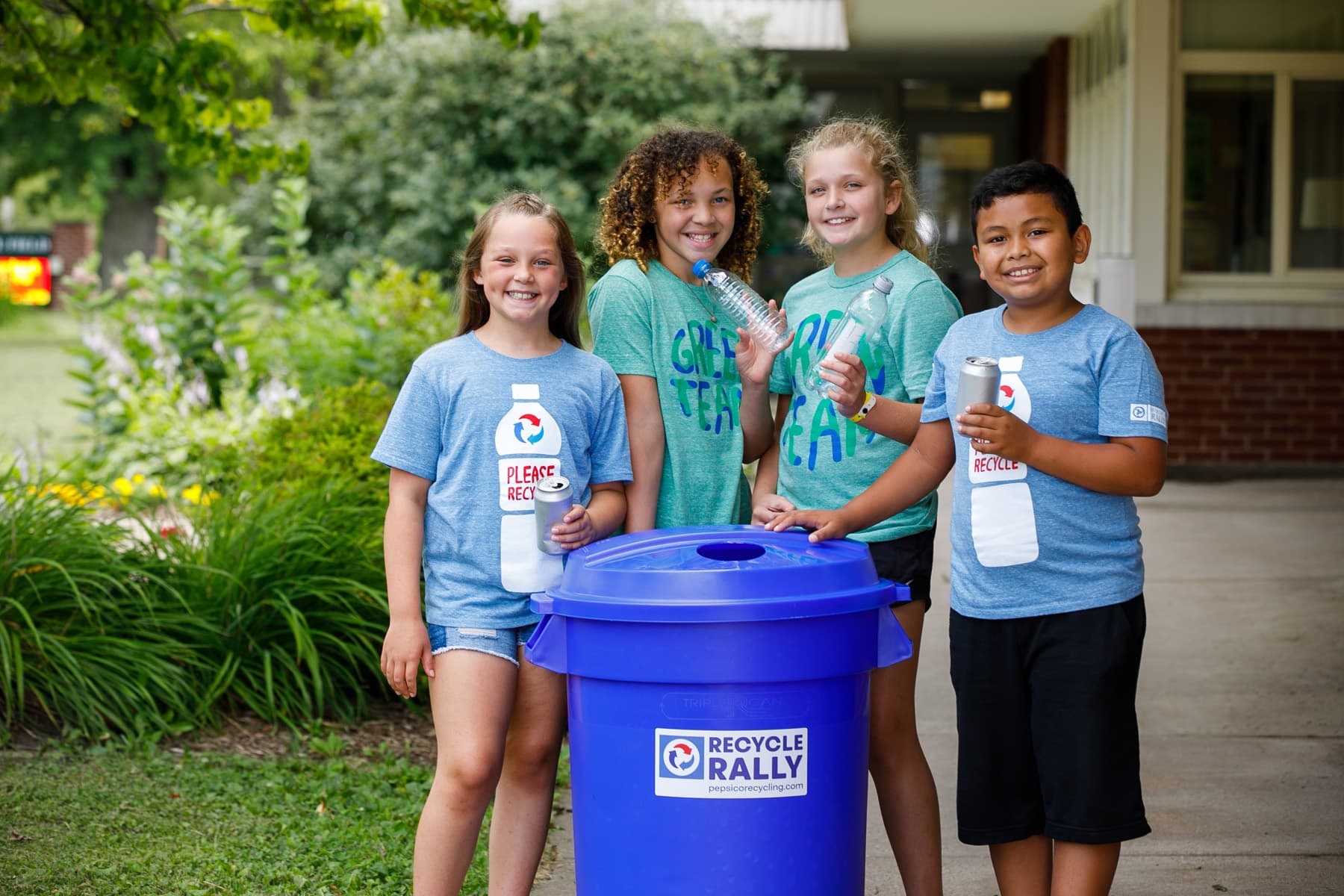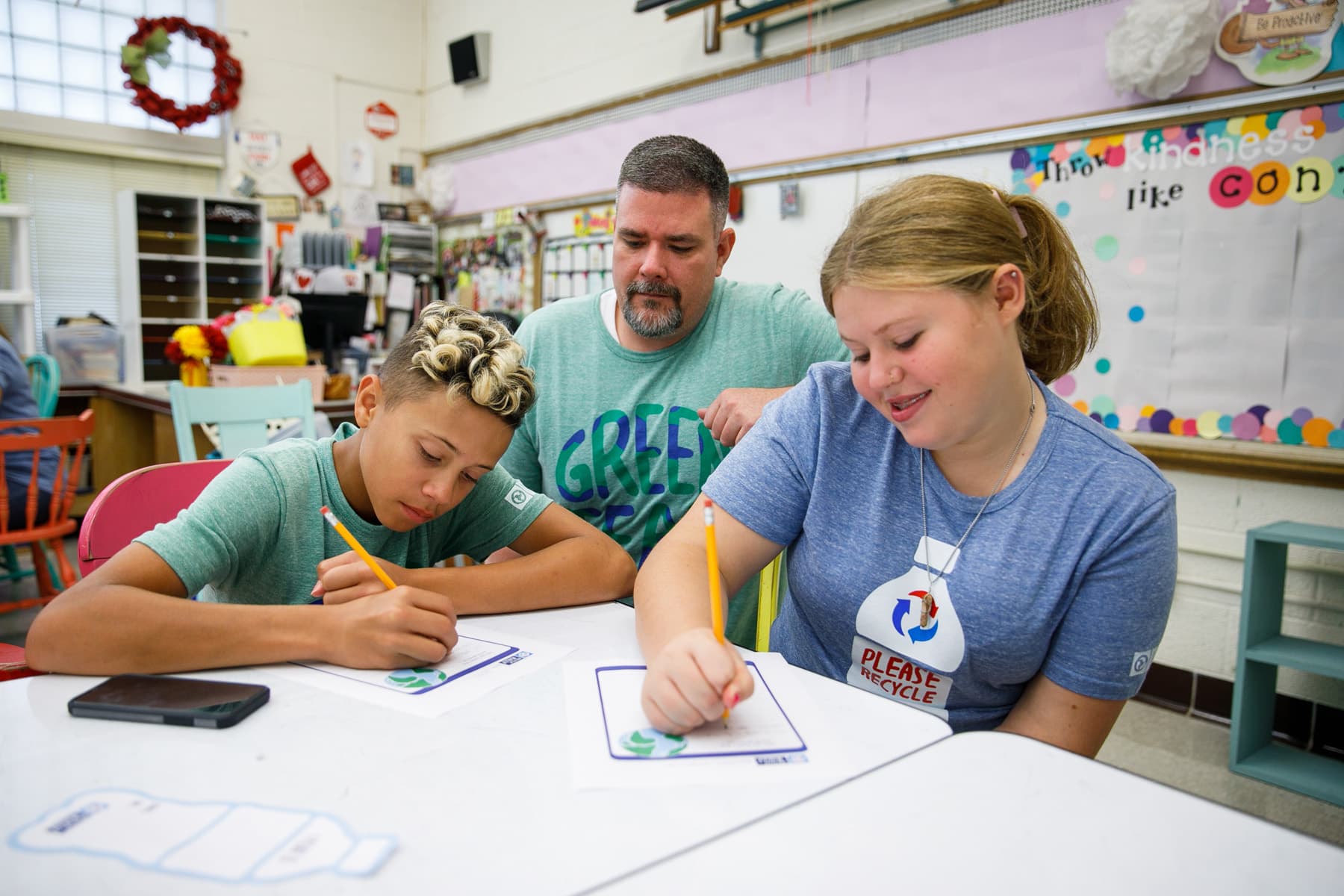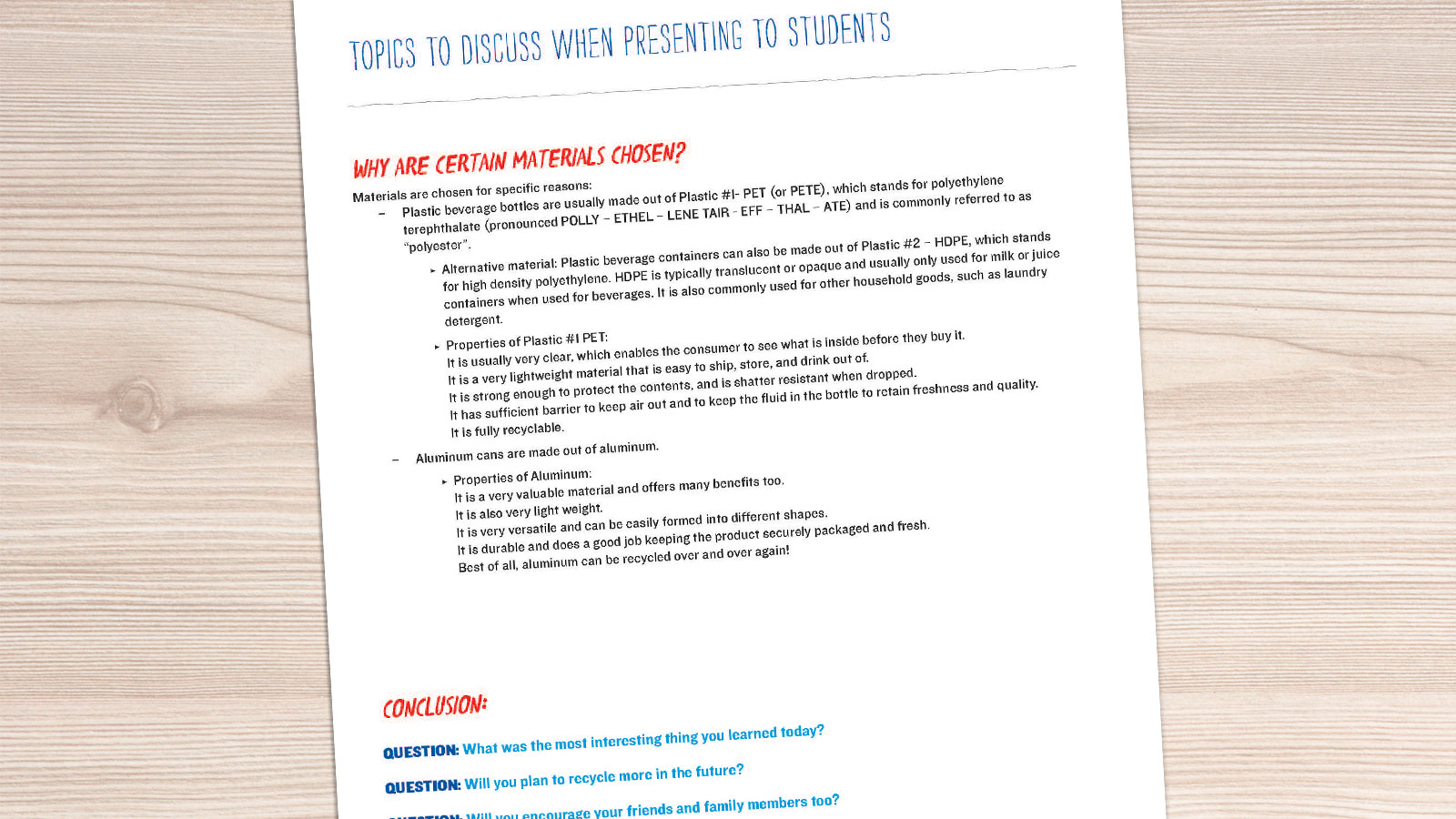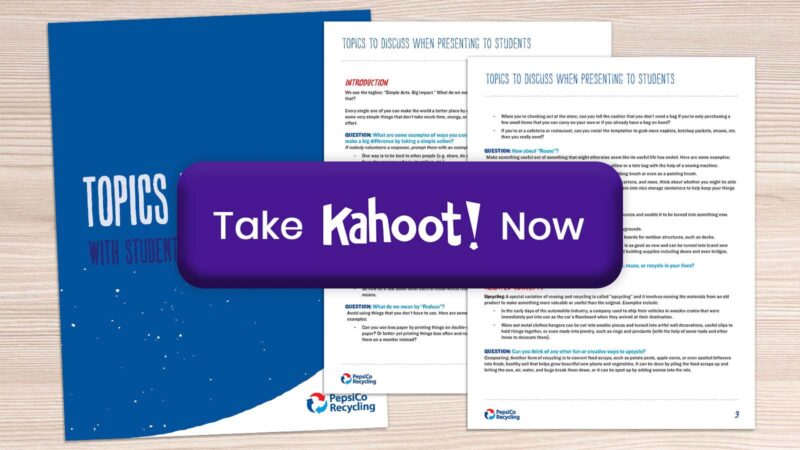Use These Recycling Discussion Topics to Get the Conversation Going
Thoughtful questions to prompt thoughtful conversation.

Looking to spark conversation around going green? These recycling discussion topics are easy to differentiate for various ages. Anyone can lead a meaningful interaction by following this simple guide. Want to see how much you’ve learned after reading this guide? Take the How Much Do You Know About Recycling? Kahoot! Quiz
Introduction
We use the tagline: “Simple Acts. Big Impact.” What do we mean by that? Every single one of you can make the world a better place by doing some very simple things that don’t take much time, energy, or effort.
Question: What are some examples of ways you can make a big difference by taking a simple action?
- If nobody volunteers a response, prompt them with an example: One way is to be kind to other people (e.g., share, do a favor for someone who is struggling, etc.)
- Any other ideas? [Allow students to list a few examples of their own]
- Here’s one more way, and it’s an important one: Consider the “Three R’s” when you consume products each day.
Recycling Discussion Topics: The Three Rs
The Three Rs are three words that start with the letter “R” that describe ways we can help keep our planet clean and beautiful. They describe ways each and every one of you can make a difference when it comes to getting the most out of our limited resources and giving ourselves a higher quality of life.
Question: Who wants to guess what the three R’s stand for?
Answer: Reduce, Reuse, Recycle
So now, let’s talk about what each of those words really means.
Question: What do we mean by “Reduce”?
Answer: Avoid using things that you don’t have to use. Here are some examples:
- Can you use less paper by printing things on double-sided paper?
- How about printing things less often and reading them on the screen instead
- When you’re checking out at the store, can you tell the cashier that you don’t need a bag if you’re only purchasing a few small items that you can carry on your own or if you already have a bag on hand?
- If you’re at a cafeteria or restaurant, can you resist the temptation to grab more napkins, ketchup packets, straws, etc. than you really need?
Question: How about “Reuse”?
Answer: Make something useful out of something that might otherwise seem like its useful life has ended. Here are some examples:
- If you grow out of your favorite t-shirt, convert it into a pillow or a tote bag with the help of a sewing machine.
- Once your toothbrush wears out, use it as a scrubbing brush or even as a painting brush.
- Before getting rid of packaging materials, such as jars, jugs, cartons, and more, think about whether you might be able to relabel them or decorate them on your own to transform them into nice storage containers to help keep your things organized.
Question: And finally, what does “Recycle” mean?
Answer: Recycling means you break something down to its useful parts or resources and enable it to be turned into something new. Here are some examples:
- Old car tires can be converted into floor tiles or mulch for playgrounds.
- Plastic bottle caps can be turned into park benches or strong boards for outdoor structures, such as decks.
- Aluminum cans can be melted down into clean aluminum that is as good as new and can be turned into brand new aluminum cans or into other cool things such as airplanes and building supplies including doors and even bridges.
Question: Can you think of any examples of how you reduce, reuse, or recycle in your lives?
Allow students time to answer.
Recycling Discussion Topics: Why Recycle?
Question: Why should we recycle? How many different reasons can you come up with?
Some of the many possible answers include:
- Preserve our limited natural resources—why waste something that we paid to obtain with money and/or effort?
- Especially since many resources are not going to be available forever—we could eventually run out of things if we don’t take care of what we have.
- Better use of our land—Use our land for more productive things like parks and neighborhoods rather than landfills.
- Prevent air and water pollution by reducing the need to dig into the ground to mine materials and reducing the number of boats, trucks and train cars needing to transport new raw materials across the globe.
- Emit fewer greenhouse gases which can have effects on climate/weather.
- Enhance national security by keeping a stable supply of resources within our borders.
- Support economic/job growth in the recycling and manufacturing industries in the U.S.
- Use less energy in the manufacturing processes as compared to making things from new raw materials.
- Did you know? Recycling an aluminum can requires less than 5 percent of the energy that would be expended in creating a similar can out of fresh bauxite ore. In addition, producing new plastic from recycled material uses only two-thirds of the energy required to manufacture it from raw materials. Recycling saves energy!
Recycling Discussion Topics: Recycle Consistently
Question: Who Should Recycle?
Answer: Everyone! It’s easy and good for the planet as well as your local community, but sadly not everyone does.
- Did you know? According to the Environmental Protection Agency, out of approximately 254 million tons of trash generated, we only recycle 34%.
Now let’s talk about beverage bottles and cans specifically.
Question: Out of every ten bottles and cans produced in the U.S. in 2015, how many of them do you think were recycled?
Answer: We recycle only four out of every ten beverage containers in the U.S.
Question: If it’s so important to recycle and it is as easy as dropping your bottle or can into the correct bin, then why doesn’t every bottle and can get recycled?
Allow students to discuss possible reasons for not recycling. Some potential reasons include:
- Some people do not have access to recycling bins or would have to drive far distances in order to find a place to recycle.
- Most people recycle sometimes but not every time they finish using a bottle or can. Sometimes they might:
- Forget to pick up their bottle or can (or forget to look for a recycling bin)
- Have trouble finding a recycling bin (if their hands are full they might not be willing to wait until they find one)
- Not realize how important it is to recycle
- Not realize how easy it is to recycle
Question: Can you think of ways to overcome these challenges and make it more likely that people will recycle?
Answer: The key is to make sure you recycle every time, even when it’s not quite as convenient as usual. Let’s talk about some times when you might be less likely to recycle your bottles and cans.
Question: What would you do in each of these scenarios?
- You’re out on a sports field and just finished slugging a bottle of water or a sports drink to stay hydrated. You don’t see any recycling bins around, but there’s a trash can nearby.
- Proposed solution: Put the empty bottle into your bag and wait until you get closer to a building or home where you can find a place to recycle it.
- You just finished your favorite beverage in the car and you’re at a gas station or convenience store that has trash cans but no recycling bins.
- Proposed solution: Keep your empty in the cup holder or use a small plastic grocery bag to collect recyclables in the car until you have a chance to recycle them.
- You and some friends are finishing up your lunches in a cafeteria or food court. The others walk a few feet to the nearest trash can and start to throw their empty bottles and cans into the trash can. The nearest recycling bin is on the other side of the room.
- Proposed solution: Take the extra steps to recycle and set a good example for them. Be a leader! Keep going even if they don’t end up following you and catch back up to them afterward. They will probably think about joining you next time.
- You don’t have recycling bins at home.
- Proposed solution: Ask your parents if there is a service in your community that allows you to opt-in for a recycling hauler to pick up recyclables at your curb on a regular basis. If that’s not available, see if there’s a local recycling drop-off center that your parent(s)’ pass by on a regular basis. If that’s not an option, see if your school will allow you to drop off your recyclables when you arrive.
Recycling Discussion Topics: How Recycling Works
Question: When you recycle at school or at home, what do you think happens next?
Encourage students to share their thoughts on what happens throughout the recycling process.
Let’s watch some short videos to learn more.
Action: Play Life Cycle of a Plastic Bottle video and Life Cycle of an Aluminum Can video. Print the accompanying posters or project them onto your screen for further discussion.
As you just saw, recycling is more than just placing a plastic bottle into a bin. The process of recycling is a well-organized sequence in order for these used materials to be turned back into new materials.
Question: What do we call a recycling facility?
Answer: Materials Recovery Facility or MRF (nicknamed “merf”). Think about that name. This facility recovers materials so they can be used again instead of ending their life cycles. The materials that you place in your recycling bins at school or at home will most likely be picked up and taken to a MRF, like the one that was shown in the video.
- Each MRF is a little bit different. Some are big, some are small. Some rely more on people to do the sorting and others on high-tech machines.
Speaking of those cool machines that help out with sorting…
Question: Do you remember what we call the machine that sorts aluminum cans?
Answer: It’s called an eddy current. It uses lots of tiny magnets spinning around so fast that the force of the currents shoot the aluminum can up and onto another recycling line! It’s like when you take two magnets and put their opposite ends together and they push themselves apart. The process is like that, but in one fast motion.
Question: After watching those videos, can you tell me what aluminum cans and plastic bottles have in common?
Answer: They’re both recyclable! By recycling, both a plastic bottle and an aluminum can can be made into brand new products.
Question: What natural resources are we saving by using recycled plastic and aluminum to make cans and bottles?
Answer: We save energy, water, oil, and minerals.
Recycling Discussion Topics: Converting Materials into Bottles and Cans
Let’s look at the poster displays to see how a can or bottle can be converted back into a new can or bottle! [Find the posters with the video links.]
Question: What is the shape of the life cycle of each material?
Answer: An oval, circle, or “loop.” That’s why the vision for a world where everything is recyclable and recycled frequently is sometimes referred to as a “circular economy.”
Question: Why is that circular “closed loop” life cycle so important?
Allow students to discuss. Possible answers include:
- No new inputs are required and there is theoretically no end to the cycle. The cycle can go on indefinitely, so it is more stable, efficient, and a smarter way to produce things.
- Compare and contrast how many new raw materials and extra steps would be needed on both the front end (capturing new materials) and the back end (disposing of materials) if recycling was not an option:
- You would have to add mining / extracting materials, transporting them to a refinery, refining them, converting them into usable state, transporting again, etc.
- You would also have to add transporting them to a landfill, heavy equipment to lift loads into the landfill and bury them, and other environmental steps and processes to make sure our land, air, and water are safe when disrupted by a landfill.
Recycling Discussion Topics: Why Do We Choose Certain Materials?
Plastic beverage bottles are usually made out of Plastic #1- PET (or PETE), which stands for polyethylene terephthalate (pronounced POLLY – ETHEL – LENE TAIR – EFF – THAL – ATE) and is commonly referred to as “polyester”.
- Properties of Plastic #1 PET:
- It is usually clear, which enables the consumer to see what is inside before they buy it.
- It is a very lightweight material that is easy to ship, store, and drink out of.
- Plastic #1 PET is strong enough to protect the contents, and is shatter-resistant.
- It has sufficient barrier to keep air out and to keep the fluid in the bottle to retain freshness and quality.
- It is fully recyclable.
- Alternative material: Plastic beverage containers can also be made out of Plastic #2 – HDPE, which stands for high density polyethylene. HDPE is typically translucent or opaque. We usually only use it for milk or juice containers when used for beverages. We also commonly use it for other household goods, such as laundry detergent.
Aluminum cans are made out of aluminum.
- Properties of Aluminum
- It is a very valuable material and offers many benefits too.
- Aluminum is also very light weight.
- It is very versatile and can be easily formed into different shapes.
- It is durable and does a good job keeping the product securely packaged and fresh.
- Best of all, aluminum is endlessly recyclable!
Did you know?
- Trees are made into paper! For every one ton of paper, you can save 17 trees.
- Most plastic bottles are made from water, petroleum and natural gas.
- Aluminum cans are made from bauxite (a reddish-colored rock that can be made into alumina powder and eventually converted into aluminum).
- It only takes 5 plastic bottles to help make a new t-shirt, 42 plastic bottles to help make new seats in a compact car. Of course, plastic bottles can be turned into more plastic bottles too! (Source: Repreve)
- Aluminum cans can be turned into an airplane, bicycles, or a brand new can.
Recycling Discussion Topics Conclusion:
Questions:
- What was the most interesting thing you learned today?
- Will you plan to recycle more in the future?
- Will you encourage your friends and family members too?
Recycling Discussion Topics Glossary of Terms
Composting
A process that allows you to decompose some of your table scraps and yard waste. This is done by layering so everything decays into fertile humus (or new soil).
Conserve
To protect something from becoming overused, harmed, or damaged.
Eddy Currents
Currents which circulate in conductors like swirling eddies in a stream. They are induced by changing magnetic fields and flow in closed loops, perpendicular to the plane of the magnetic field.
Landfill
A facility where municipal solid waste is disposed in a series of layers and covered daily with soil and other types of materials.
Litter
Waste materials that are carelessly discarded or put in the wrong place.
Materials Recovery Facility (MRF)
Facility designed to remove usable products or resources from the waste stream.
Natural Resource
Naturally occurring material such as soil, wood, air, water, oil or minerals. They are valuable to people, plants, and wildlife.
Nonrenewable Resource
A natural material that is finite in amount (e.g., coal, copper, petroleum). This is because it takes a great length of time to form (longer than a lifetime, maybe more).
Recyclables
Products or materials that can be collected, separated, and processed to be used as raw materials in the manufacture of new products.
Recycle
The collection and reprocessing of manufactured materials for reuse either in the same form or as part of a different product.
Reduce
Lessen the amount, degree, extent, number or price—in this case, amount of waste.
Waste Reduction
Reducing the amount of waste produced by careful buying, less wasteful practices, or reuse of materials.
Take the How Much Do You Know About Recycling? Kahoot! Quiz
Topics for Discussion with Students
Learn More

Recycle Rally
Recycle Rally is a free K-12 program that provides rewards and tools to help enhance recycling at your school!
Explore now
Additional Resources
Our comprehensive library of resources was designed to inspire the next generation of green leaders.
Explore now






